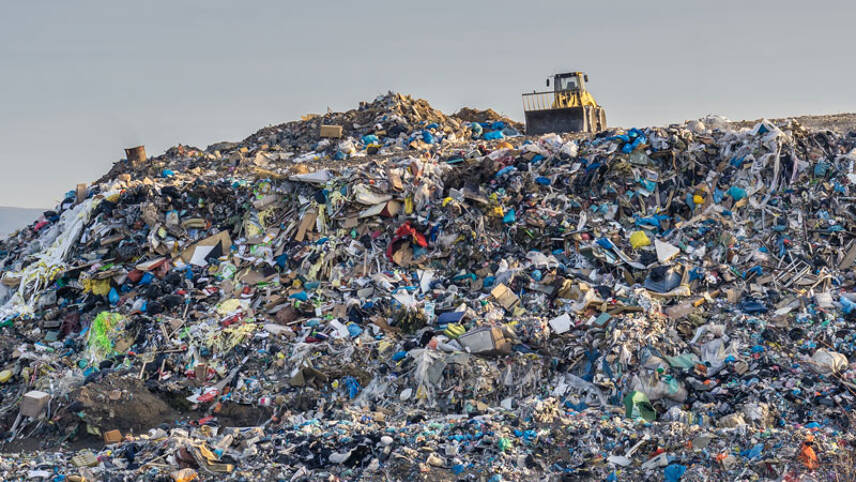Register for free and continue reading
Join our growing army of changemakers and get unlimited access to our premium content

Global plastic recycling rates are stagnating at around 9%
That is according to a new study from Systemiq, published today (19 September) to coincide with the UN’s meetings in New York.
The study assessed what would likely happen in terms of plastic production and recycling volumes through to 2040 without further interventions from policymakers. It then explored the potential impact of 15 different policy interventions floated in negotiations on the UN’s new global treaty on plastics, including virgin plastic taxes and bans on the most problematic items.
In a business-as-usual scenario, the study found, virgin plastic production would continue to increase. It would likely be 66% higher in 2040 than in 2019, with fossil fuel majors turning to plastics to maintain profitability as the energy transition accelerates.
Capacity additions for managing the increased levels of waste plastic would not occur so rapidly. The study forecasts that, in 2040, almost twice as much plastic by weight would be mismanaged than in 2019.
Mismanagement is an umbrella term that includes dumping material in the open or in poor-quality landfills; releasing plastics into water and burning plastics in the open. Around 30% of all plastic wasted in 2019 was mismanaged, most of it from consumer goods packaging. Recycling rates plateaued at around 9% globally.
Proposed policy interventions
The UN is in the process of convening nations to develop a new global treaty intended to end plastic pollution. A final version is expected to be agreed upon in 2024 following the release of an initial draft earlier this month.
The study assesses how 15 policy interventions could be included in the treaty, compelling nations to scale back virgin plastics production and invest in recycling indrastructure to properly achieve the headline ambition.
In the scenario assessed in the study, whereby all interventions are made, global virgin plastic production is 30% lower in 2040 than in 2019. It is also 60% lower than it would have been in 2040 with no interventions.
Delivering this level of reduction would require national, time-bound numerical targets to reduce virgin plastic production volumes, as well as similar targets to scale reuse for applications where plastics are avoidable.
The delivery of such targets would be supported by high taxes on virgin plastics, of at least $1,000 per tonne, plus outright bans on the most polluting plastics. Nations would also need to work with industry to scale sector-specific alternatives for goods such as fishing gear and construction-related packaging.
Whether the UN treaty should include production had been a sticking point in the early parts of the negotiations; major plastic-producing nations plus businesses in this sector pushed against this approach and promoted one weighted towards recycling. Ultimately, nations agreed that production should be cut.
The Systemiq study also outlines policies to dramatically scale up recycling capacity, with a focus on developing and emerging economies. Its scenario would deliver a seven-fold increase in global plastics recycling output and a 90% reduction in global volumes of plastics mismanaged each year, again within the 2019 to 2040 timeline.
Policy interventions that would need to be made include a new global mandate for improved design rules that would, in time, phase out the majority of hard-to-recycle plastic packaging and products from the market. Businesses would need to be subjected to enhanced extended producer responsibility (EPR) requirements to fund recycling, also.
National governments would additionally need to increase their targets for recycling rates and back these targets up with expanded and improved offerings of segregated plastic collections to homes and businesses.
The report emphasises the need for just transition principles to be embedded in national planning. Developed nations may see their plastics production workforces and waste management workforces shrink while developing and emerging nations will likely see them expand. This will present an opportunity to enhance labour rights and human rights by offering people better quality jobs than the informal waste picking work they currently carry out.
Many of the interventions floated in the report are being promoted by the UN. The UN stated earlier this year that delivering the plastic treaty’s ambition could deliver more than $4.5trn in cost savings by 2040.
Systemiq was commissioned by the Nordic Council of Ministers for the Environment and Climate to complete the study. The Council includes representatives from Denmark, Finland, Iceland, Norway, Sweden, Greenland, Aland and the Faroe Islands.
Norway’s Minister of Climate and Environment Espen Barth Eide said: “Plastic pollution is everywhere. Without new and effective control measures, plastic production is set to double in 20 years, and the release of plastics to air, land and water will follow suit. We now have a window of opportunity to develop an effective plastic treaty by the end of 2024.”


Please login or Register to leave a comment.